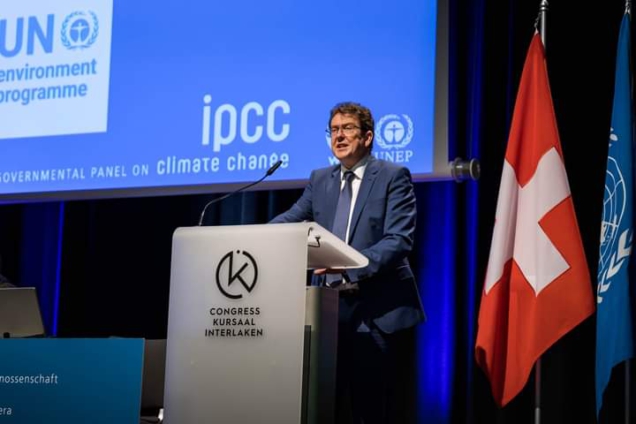
Audio By Carbonatix
The Inter-governmental Panel on Climate Change (IPCC) has begun a four-day conference to finalise the Synthesis Report to the Sixth Assessment Report, which will serve as the primary policy document for influencing climate action.
Over 650 delegates are expected to attend the IPCC plenary, taking place in Interlaken, Switzerland, until March 17.
Addressing the conference, IPCC Chair Hoesung Lee stated that once approved, the document will be a much-needed textbook for policymakers today and tomorrow.
"Once approved, the Synthesis Report will become a fundamental policy document for shaping climate action in the remainder of this pivotal decade. For policymakers of today and tomorrow, a much-needed textbook for addressing climate change. Make no mistake, inaction and delays are not listed as options.”
The Synthesis Report is the IPCC's Sixth Assessment Report's final installment, integrating and summarising the conclusions of the six IPCC reports released during the current cycle, which began in 2015.
Three Special Reports and three IPCC working group contributions to the Sixth Assessment Report are included in the report.
The IPCC will approve the Synthesis Report Summary for Policymakers line by line, and the panel will also adopt the full report section by section.
The host country's Federal Councilor, Albert Rösti, stated that the results of the intergovernmental panel on climate change will assist policymakers in making educated choices about climate change.
“Science and knowledge must play a central role in shaping our policy-making, guiding us as we work to mitigate and adapt to the impacts of climate change,” said Mr Rösti.
According to UN Secretary-General António Guterres, the IPCC's evidence for climate change has been clear, persuasive, and irrefutable, and must guide the way to solutions to the urgent need to cease global warming with cold, hard facts.
“The IPCC must now point the way to solutions so the urgent need to end global heating with cold, hard facts," said António
At the plenary, video messages from Mr. Guterres and WMO Secretary-General Prof. Petteri Taalas praised the IPCC's hard work on the reports, which he said had a clear message for decision-makers.
“We need to speed up our climate actions. At the moment, we are heading towards too high warming, and the various impacts of climate change are already very visible worldwide,” said Prof. Taalas.
The Intergovernmental Panel on Climate Change (IPCC) is a United Nations group that was founded in 1988 to offer political leaders with periodic scientific assessments of climate change, its consequences, and hazards, as well as to propose adaptation and mitigation solutions.
Latest Stories
-
Lekzy DeComic gears up for Easter comedy special ‘A Fool in April’
1 hour -
Iran declares 40 days of national mourning after Ayatollah Ali Khamenei’s death
2 hours -
Family of Maamobi shooting victim makes desperate plea for Presidential intervention
3 hours -
Middle East turmoil threatens to derail Ghana’s single-digit gains
3 hours -
Free-scoring Semenyo takes burden off Haaland
4 hours -
Explainer: Why did the US attack Iran?
5 hours -
Peaky Blinders to The Bride!: 10 of the best films to watch in March
5 hours -
Crude oil price crosses $91 as Strait of Hormuz blockade chokes 22% of global supply
5 hours -
Dr. Hilla Limann Technical University records 17% admission surge; launches region’s first cosmetology laboratory
6 hours -
Over 50 students hospitalised after horror crash ends sports tournament
7 hours -
Accra–Dubai flights cancelled as Middle East tensions deepen
7 hours -
See the areas that will be affected by ECG’s planned maintenance from March 1-5
8 hours -
Kane scores twice as Bayern beat rivals Dortmund
8 hours -
Lamine Yamal hits first hat-trick in Barcelona win
8 hours -
Iran says US and Israel strikes hit school killing 108
8 hours

